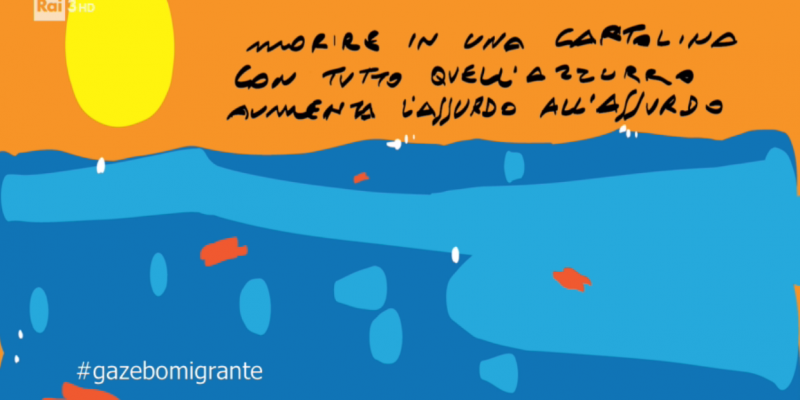1. Mediterranean, the struggle to save migrants’ lives
The sea is calm, but the situation is desperate. Humanitarian NGOs continue their daily struggle in the Mediterranean to carry on their search and rescue operations, thanks to which hundreds of people are saved from drowning every day: over 8,000 people were rescued during the long Easter weekend, many of whom by the NGOs. Further complications arise from the obstruction by European authorities, especially Frontex, have been levelling serious (and unfounded) accusations at humanitarian operators, rather than extend their gratitude. The NGOs have retorted by pointing out the EU’s political responsibilities for the thousands of deaths at sea.
Read Barbie Latza Nadeau’s for CNN and Niamh McIntyre’s article for the Independent.
2. Mediterranean, off the coasts of Libya, all the way to Lampedusa
Sometimes words are not enough, however, and this is why the TV programme Gazebo has chosen to report the tragedy unfolding every day off the coasts of Libya, through the images collected by journalist Giacomo Zandonini. The host of the programme also takes us to the island of Lampedusa for a day. Watch the episode #GazeboMigrante.
3. Italy, the new immigration law that denies migrants of fundamental rights
Meanwhile, Italy’s much-criticised new immigration bill drafted by Minniti and Orlando is now a reality, and there is really no cause for celebrating: Annalisa Camilli’s article for Internazionale explains the content of the new law and why it might be unconstitutional (also read Luciano Scalettari’s commentary in Famiglia Cristiana and our own in-depth analysis).
4. Italy and the lies about Romanian criminals
There has been a lot of discussion in recent days over the claims by Italy’s vicepresident of the Chamber of Deputies Camera Luigi Di Maio, who went on record saying “Italy has imported 40 per cent of Romania’s criminals”. Here are the data debunking this claim, with a commentary by CILD President, Patrizio Gonnella – in Eleonora Camilli’s article for Redattore Sociale and the fact-checking by Agi.
5. France, the valley of rebels taking in refugees
In the South of France – a stronghold of the nationalist movement led by Marine Le Pen – there is a special place called the Roja Valley, where citizens are refusing to “let humanity die”. Many, then, are taking it upon themselves – despite countless practical challenges and the fear of legal prosecution (given the alarming trend towards the criminalisation of humanitarian efforts and the many cases of people found guilty of solidarity) – to take in dozens of people on the move. Read Eliza Mackintosh and Edward Kiernan’s great report for CNN.
6. Germany, a year in the “useful village” that became a sanctuary for refugees
In the fall of 2015, Germany chose the village of Sumte – population 102 – as a sanctuary for nearly 800 refugees. What happened in the following months? Read Ben Mauk’s extensive and touching report in VQR.
7. The EU relocation programme is not a success, it’s a failure
Were it not for the tragic plight of thousands of people, one could almost smile at the hypocrisy of the European Commission calling its relocation programme a success, while at the same time announcing the further reduction of its overall targets: from 160,000 people to just over 33,000. Meanwhile, European governments, far from making an effort of solidarity, are washing their hands of the matter. Read Nikolaj Nielsen’s article for EU Observer (as well as the months-old, but still relevant op-ed by Nando Sigona).
8. Reflections from a refugee camp
Growing up in a refugee camps means receiving no adequate education and having no personal or professional prospects. This is the plight of hundreds of thousands of people around the world. How can we fix it? Read this reflection by Alexander Betts, director of the Refugee Studies Centre at the University of Oxford, in the Economist.
9. When humanitarians serve the establishment instead of refugees
Humanitarian organisations face many challenges, and in the escalating competition for funding and influence, many risk losing their way, and end up serving the establishment instead of refugees. Read what Daniel Wordsworth, CEO of the American Refugee Committee, wrote in Refugees Deeply.
10. Digital refugees, how social media help people find their missing families
Millions of people on the move, thousands upon thousands of them go missing during their desperate journeys, and social media are often the only tool families can rely on to locate their loved ones. Read Eric Reidy’s article in Wired.
Translation by Francesco Graziosi.
Header-photo: Makkox’s illustration for #GazeboMigrante [text can be roughly translated in: “Drowning in a postcard scenery, adding absurdity to absurdity”]









